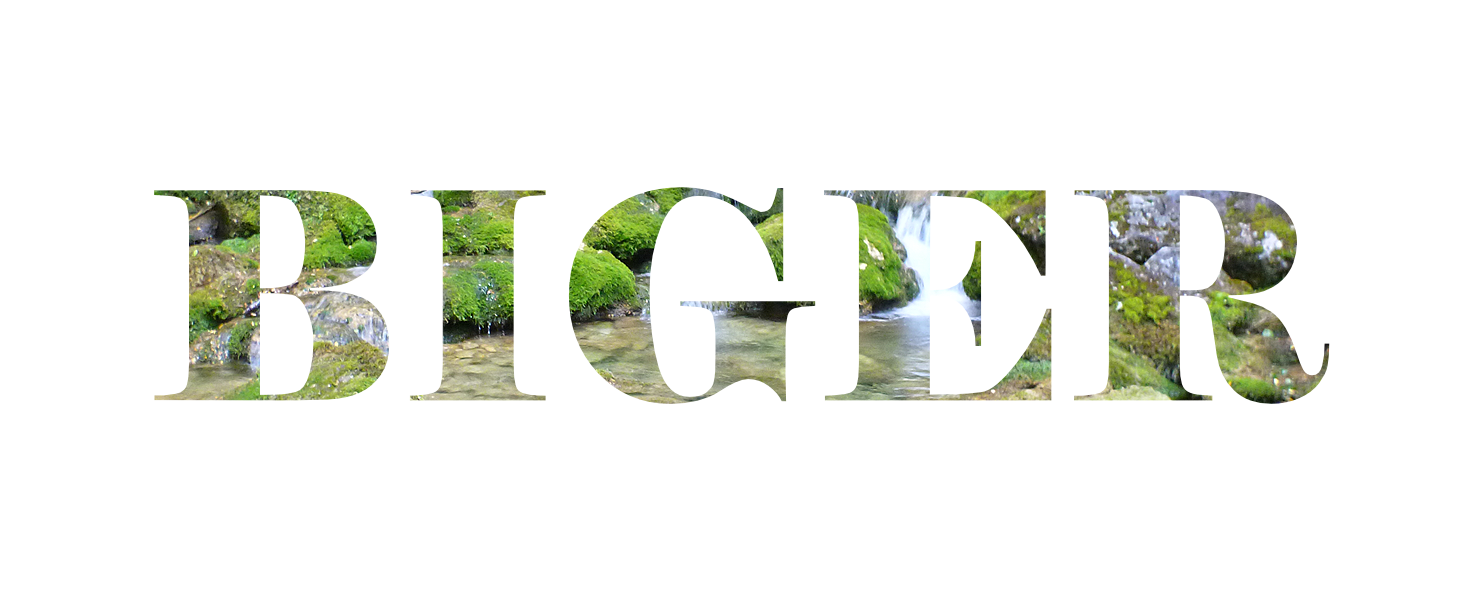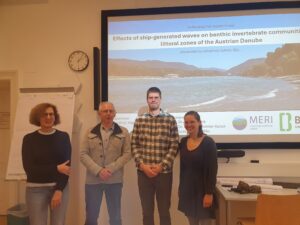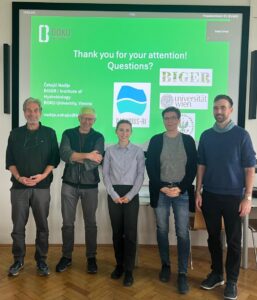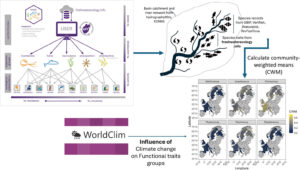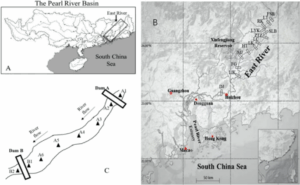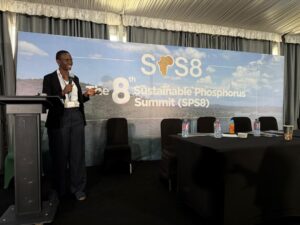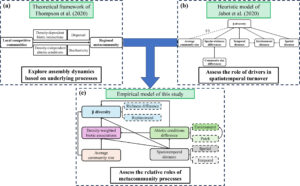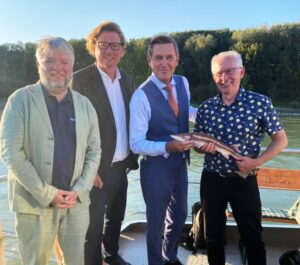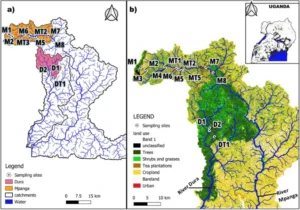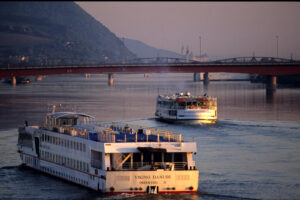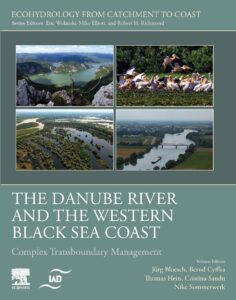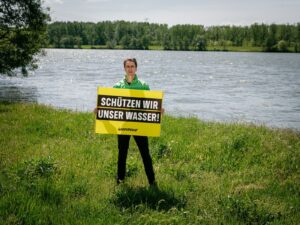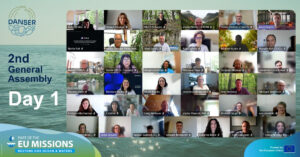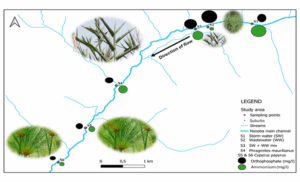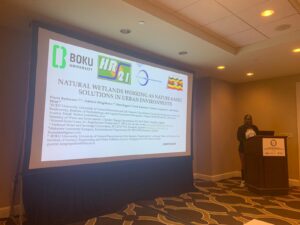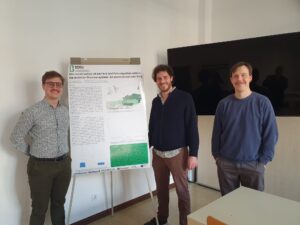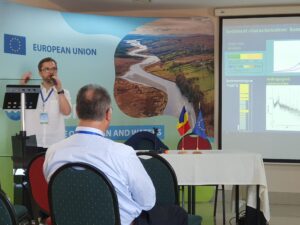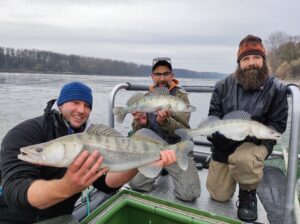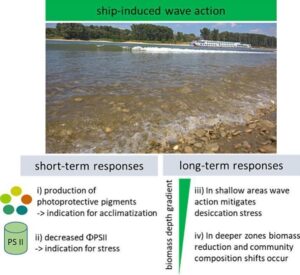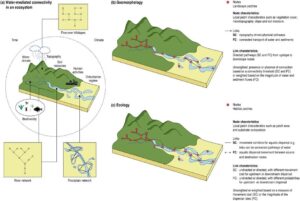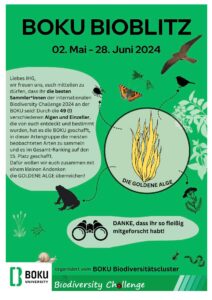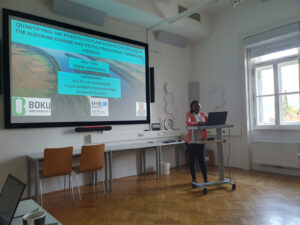Newsarchive - Biger in the News
Congratulations Johannes Kührer!
A big congratulations to Johannes Kührer for successfully defending his Master’s thesis „Effects of ship-generated waves on benthic communities in littoral zones of the Austrian Danube“, supervised by Thomas Hein, Andrea Funk, Elisabeth Bondar-Kunze, and Anna-Lisa Dittrich.
This research enhances our understanding of how navigation impacts biodiversity in industrialized rivers, contributing valuable insights for sustainable river management.
Well done, Johannes!
The study is important for the MERI, MARITE, DANSER, ACWA and several other EU projects.
Exciting New Publication
A recent study entitled “ ‘specleanr’: an R package for automated flagging of environmental outliers in ecological data for modeling workflows“, authored by Anthony Basooma, Astrid Schmidt-Kloiber, Sami Domisch, Yusdiel Torres-Cambas, Marija Smederevac-Lalić, Vanessa Bremerich, Paul Meulenbroek, Martin Tschikof, Andrea Funk, Thomas Hein, Florian Borgwardt, has been published in Ecography.
Authors have released a new R package called specleanr, offering 20 methods to detect outliers in species occurrence data based on environmental variables. The package uses LOESS regression to define thresholds and classifies records by their likelihood of being anomalies. specleanr is versatile and can be used beyond ecological modeling for any data analysis requiring robust outlier detection.
To read the full article online, please click here: https://doi.org/10.1002/ecog.08221
Congratulations Nadija Čehajić!
Nadija Čehajić have successfully defended her Master thesis entitled: „Spatial patterns of greenhouse gas emissions in a floodplain system“, supervised by Univ.Prof. Dr. Thomas Hein, Mag., Dr. Elisabeth Bondar-Kunze and Dr. Anna Katarzyna Sieczko.
The study is important for the DANUBIUS and several EU projects.
New Scientific Paper Published: Introducing fwtraits – an R package for obtaining freshwater biodiversity trait information
A recent study authored by Anthony Basooma, Florian Borgwardt, Sami Domisch, Merret Buurman, Vanessa Bremerich, Sonia Steffany Recinos Brizuela, Martin Tschikof, Thomas Hein, and Astrid Schmidt-Kloiber has been published in Basic and Applied Ecology.
The paper presents fwtraits, an open-source R package that provides easy access to ecological trait data for freshwater biodiversity research. It enables scientists to retrieve, filter, and analyse species traits efficiently, supporting trait-based ecological and functional assessments. By promoting data transparency and integration, fwtraits helps improve the consistency and reproducibility of freshwater ecosystem studies.
To read the full article online, please click here: https://doi.org/10.1016/j.baae.2025.10.010
New Scientific Paper Published
A recent study titled ‚The dynamics of linked social–ecological action situations reveal governance changes in the Austrian Danube ‘, authored by Yanhua Shi, Sonia Steffany Recinos Brizuela, Thomas Hein, Andrea Funk, and Christian Kimmich, has been published in Journal of Environmental Management.
This research applies a novel integrative modeling framework to assess how land‐use change, and hydrological alteration drive nutrient exports in riverine systems. The authors combine field measurements, statistical models, and scenario analysis to disentangle direct and indirect influences on nutrient fluxes. Their results demonstrate that shifts in landscape connectivity and flow regimes substantially affect nutrient loads, with implications for catchment management and water quality policy.
To read the full article online, please click here: https://doi.org/10.1016/j.jenvman.2025.127662
Responses of Oligochaeta and Chironomidae to restoration of connectivity in a river–floodplain stretch of the Upper Danube River – a new paper was published
A new paper co-authored by Dr. Sonia Recinos Brizuela, Prof. Dr. Thomas Hein, Dr. Andrea Funk and co-authors has been published in Restoration Ecology. The study discusses how restoration goals can be adapted to ongoing environmental changes, highlighting that returning ecosystems to their historical state is often no longer realistic.
The authors propose more flexible, forward-looking strategies that focus on ecosystem resilience and functionality under future conditions. This shift in perspective supports the development of adaptive management approaches in restoration practice.
The article is available online: https://doi.org/10.1111/rec.70238
New Scientific Paper Published: Phytoplankton similarity indices as ecological metrics in a fragmented river system
A new study co-authored by Thomas Hein and Olena Bilous, and colleagues, explores how dam-induced fragmentation affects phytoplankton communities in China’s East River. The paper, published in Hydrobiologia, shows that non-dominant algal groups are surprisingly strong indicators of environmental change, offering new insights into monitoring river ecosystem health.
The study highlights how cascading dams can transform river systems into lake-like environments, reducing spatial diversity and altering nutrient dynamics. These findings contribute to improving ecological assessment methods for regulated rivers worldwide.
To read the full article online, please click here: https://link.springer.com/article/10.1007/s10750-025-06022-w
8th Global Sustainable Phosphorus Summit (SPS8), 30 September – 3 October 2025, Accra (Ghana)
Sharon Gubamwoyo had the privilege of attending the 8th Sustainable Phosphorus Summit in Accra, Ghana, with a major focus on achieving sustainable phosphorus management in Africa and globally. The summit enabled collaborations, innovation, and capacity development.
New Scientific Paper Published
A recent study titled ‚Drivers of metacommunity dynamics in river-floodplain fish: A Path Modeling Approach‘, authored by Kai Feng, István Czeglédi, Andrea Funk, Thomas Hein, Didier Pont, Paul Meulenbroek, Alice Valentini and Tibor Erős, has been published in Ecological Monographs.
The research introduces a novel path modeling approach using eDNA data to examine the main drivers of fish metacommunity dynamics in river-floodplain ecosystems. The study reveals that lateral hydrological connectivity has a significant impact on beta diversity, both directly and indirectly, offering valuable insights for the conservation and management of biodiversity in dynamic floodplain habitats.
To read the full article online, please click here: https://doi.org/10.1002/ecm.70036
BIGER at the 40th Annual Meeting of the German Limnological Society (DGL), 8–12 September 2025, Goethe-Universität Frankfurt
At this year’s DGL conference, BIGER team members presented new research on restoration and connectivity in riverine ecosystems.
Anna-Lisa Dittrich presented “Waves under control? Morphological restoration as a strategy to mitigate navigation-induced disturbances,” with contributions from BIGER colleagues Prof. Dr. Thomas Hein, Dr. Olena Bilous, Dr.Andrea Funk, Dr.Paul Meulenbroek, and Dr.Elisabeth Bondar-Kunze, alongside external partners.
Johannes Kowal presented “Connectivity loss in river networks: insights into longitudinal, lateral and temporal dimensions,” with contributions from BIGER colleagues Prof. Dr. Thomas Hein and Dr.Andrea Funk, in collaboration with external partners.
These talks highlight the active involvement of BIGER researchers in advancing knowledge on restoration strategies and connectivity in freshwater systems.
Geographies of a Changing Europe, 8 – 11 September 2025, Austrian Academy of Sciences, Vienna
At the 10th EUGEO Congress “Geographies of a Changing Europe” (8–11 September 2025, Vienna, Austria), Dr Ronald Pöppl delivered a talk on “DANube SEdiment Restoration (DANSER): Towards deployment and upscaling of sustainable sediment management across the Danube River basin (The Upper Danube case).” The presentation was co-authored by several researchers, including BIGER team members Prof. Dr. Thomas Hein, Dr. Sonia Steffany Recinos Brizuela and Johannes Kowal, who made substantial contributions to the work.
3rd International Conference on Sustainability in Hydropower (SUSHP 2025), 2–5 September 2025, BOKU University, Vienna, Austria
Our working group actively contributed to SUSHP 2025. Priv.-Doz. Dr. Daniel S. Hayes served on the Local Organizing Committee and chaired the International Scientific Committee. He is currently the lead editor of a special journal collection in Environmental Management, dedicated to publishing actionable, peer-reviewed contributions from the conference.
PhD student Anthony Basooma presented on “Trends in the loss of longitudinal connectivity of the Nile River Basin due to hydropower dams,” and “Hydropower dams and other ecological stressors variably affect river catchments in Europe” while PhD student Johannes Kowal shared work on “River network connectivity in Austria: A detailed status quo assessment, changes over time, and implications for more sustainable hydropower generation.” Deputy of working group leader Dr. Elisabeth Bondar-Kunze delivered a talk on “Hydropeaking-Induced Habitat Instability and Algal Community Shifts: A Case Study from the River Salzach (Austria).” Overall, we had a wonderful time together, exchanging scientific insights and fostering collaboration.
Austria Among Europe’s Leaders in Danube Research and Innovation
„With our Danube projects, Austria is one of the leading European contributors,“ said Innovation Minister Peter Hanke of the Federal Ministry for Innovation, Mobility, and Infrastructure. On August 25, the Minister visited several initiatives along the Danube east of Vienna, including the Fischa river mouth, Dynamic LIFE Lines Danube, MERLIN, LIFE WILDisland, the Bad Deutsch-Altenburg pilot project, and the fish monitoring project of BOKU’s Institute for Hydrobiology and Water Management, which is carried out within the Christian Doppler Laboratory MERI. BIGER members are actively involved in a number of these projects and contribute considerably to their success.
BIGER Group: Coordinating Austria’s Role in DANUBIUS-RI
BOKU University leads Austria’s contribution to the European research infrastructure DANUBIUS-RI (ERIC) via the „Upper Danube Austria“ supersite. The region, which covers the Upper Danube, its floodplains, and pre-Alpine rivers, allows for multidisciplinary research into freshwater ecosystems and their management in the face of climate and land-use change.
The supersite is led by Univ.Prof. Dr. Thomas Hein, the BIGER group’s leader, and its operations are coordinated by Priv.Doz. Dr. Daniel S. Hayes, another BIGER member. Their efforts ensure that Austria’s contribution to DANUBIUS-RI results in strong strategies for managing freshwater ecosystems throughout times of global change.
Read the full paper here: https://link.springer.com/article/10.1007/s00027-025-01219-6
ORF Article
Prof. Dr. Thomas Hein and Anna-Lisa Dittrich shared their expertise and insights on the ecological effects of ship-generated waves in the Danube and inland waters. They gave interviews for the ORF article, explaining how shoreline algae, plants, and juvenile fish are affected by these waves. Our team is very happy and grateful to have such knowledgeable colleagues.
https://science.orf.at/stories/3231254/
Photo: Victor Mello
BIGER at the 14th Symposium for European Freshwater Sciences SEFS 14. Preserve Freshwater, Advance Science, and Leave Hope for Tomorrow!
Our working group attended an outstanding conference focusing on freshwater ecosystems, which took place at Bolu Abant Izzet Baysal University in Bolu, Turkey, from 20 to 25 July 2025.
The event provided a fantastic opportunity to hear from world-renowned plenary speakers and to engage with fellow scholars, who presented their latest findings and ideas. The conference aimed to foster collaboration among researchers, professors and scientists to promote innovation and advancement in future studies. One of the main topics discussed was the conservation of freshwater systems, an issue that is becoming increasingly important in modern ecological studies.
A new book is out! The Danube River and the Western Black Sea Coast: Complex Transboundary Management.
We are proud to announce the release of The Danube River and the Western Black Sea Coast: Complex Transboundary Management as part of the renowned Elsevier series, Ecohydrology from Catchment to Coast, which focuses on the world’s largest rivers. This volume is edited by the internationally recognised experts Jürg Bloesch, Bernd Cyffka, Thomas Hein, Cristina Sandu, and Nike Sommerwerk.
The book focuses on the catchment area of the Danube, the second longest river in Europe, and the adjacent Western Black Sea coast. It presents the complex interplay between natural and social processes, biodiversity issues, and the intricate links between sea and river.
Prof. Dr. Thomas Hein is one of the editors and authors of the book, and other group members, Dr Andrea Funk and Dr Martin Tschikof, contributed chapters as authors.
More details can be found here:
https://www.sciencedirect.com/book/9780443186868/the-danube-river-and-the-western-black-sea-coast
IHG is leading the environmental DNA (eDNA) activities for JDS5, the largest river monitoring campaign in Europe. We’re proud that our team member, Dr. Paul Meulenbroek, is in charge of eDNA for fish. The sampling campaign is currently ongoing along the entire Danube River — from the source to the mouth, covering ~3,000 km — and around 300 samples are expected to be collected in just three weeks! A major step toward understanding and protecting biodiversity in one of Europe’s most important river systems.
Exploring Floodplain Ecology: An International Summer School with Hands-On Participation from Our Team.
The CEEPUS–EcoManAqua International Summer School “Floodplain Ecology” was attended by members of the BIGER working group from July 7–11, 2025, at the University of J. J. Strossmayer in Osijek and Kopački Rit. Prof. Thomas Hein gave lectures on floodplain ecology and Dr. Olena Bilous gave a presentation on the ecology of algae, as part of the HR–AT (Croatia–Austria, AT-1101-09-2425) collaboration. Our students actively participated in the program as well: master’s student Nadija Čehajić and doctoral student Bhargavi Nerikar. The school provided students with practical experience in river-floodplain ecology, biodiversity, and conservation.
– Network connectivity (Elisabeth Bondar-Kunze et al.)
– Mitigating shipwave-induced effects (Anna-Lisa Dittrich et al.)
– Large river restoration measures (Andrea Funk et al.)
– Fish ecology and environmental flows in Central Asia within the Hydro4U project (Daniel S. Hayes et al.)
Photos: Mirjam Reither
Participants improved cooperation, exchanged updates, and honed the project’s course for the upcoming stages. The conversations were actively participated in by our team, which included Johannes Luca Kowal, Dr. Ronald Pöppl, Prof. Thomas Hein, and Dr. Sonia Steffany Recinos Brizuela.
DANSER aims to address the impacts of human activity and climate change on river systems, restore sediment balance, and enhance water quality.
New Scientific Paper Published
Celebrating UNESCO’s Water Science Legacy
On June 12, our team member, Dr. Paul Meulenbroek, had the honour of participating in an event marking the 50th anniversary of the Intergovernmental Hydrological Programme (IHP) and 60 years of UNESCO’s commitment to water sciences.
The event took place in Paris, where Dr. Meulenbroek contributed as an expert speaker during the side event „Joint Danube Survey 5 – Science, Society, and the Invisible in the River: Bringing Science to Citizens.“
His talk, titled “Biodiversity in a Drop: Monitoring Nature with eDNA,” focused on the innovative use of environmental DNA (eDNA) in tracking and preserving aquatic biodiversity.
#MERI
New Scientific Paper Published
A new Open Access article has been published in the Journal of Environmental Management, titled:
„Assessing Land Use Changes and Agricultural Practices in Highland Valley-Bottom Wetlands in the Taita Hills, Kenya“
by Sharon Gubamwoyo, Thomas Hein, Janne Heiskanen, Damaris Guranya Kisha, Petri Pellikka, Georg Gruber, Victor Apondi Omondi, Sonja Maria Leitner, Gabriele Weigelhofer, James Mwang’ombe Mwamodenyi, Amose Ouko Obonyo, and Gretchen Maria Gettel.
To read the full article online, please click here:
14thInternational Symposium on Biogeochemistry of Wetlands and Aquatic Systems
(Baton Rouge, LA, USA)
Our working group actively participated in the inspiring BioGeo 2025 symposium, engaging with the application of biogeochemical principles to address environmental and societal challenges across diverse systems.
This year’s theme highlighted the critical role of coastal zones—where freshwater from rivers and lakes meets estuarine and coastal ocean waters. Changes in runoff timing and discharge volume in these zones can lead to significant shifts in key drivers of biogeochemical cycling, including temperature, salinity, nutrient availability, sediment transport, and contaminant loads.
Our PhD student, Flavia Byekwaso, contributed to the symposium by presenting her work on urban tropical wetlands.
The EGU General Assembly 2025 was held in Vienna, Austria, from 27 April to 2 May.
During this week-long event, our team presented their achievements. Topics covered during the poster sessions included ecosystem dynamics, sediment transport in the Danube River and its tributaries, and the human impact on tropical urban rivers and wetlands. Our team also delivered oral presentations on topics such as floodplain connectivity, biogeochemical dynamics, and greenhouse gas emissions from tropical, groundwater-fed springs. We also gave a presentation on the drivers of stream metabolism in human-impacted mountain streams in Uganda.
Congratulations to our incredible team on these excellent presentations! Keep up the fantastic work!
Congratulations Peter!
Peter Bader successfully defended his MSc thesis entitled: ‚Analysing amphibian metacommunities in river-floodplain systems using eDNA metabarcoding: The importance of spatial connectivity and environmental conditions‘.
An important study for supported by FWF project RIMECO (Functioning of vertebrate metacommunities in dynamic riverine landscapes: an innovative approach using eDNA metabarcoding) https://forschung.boku.ac.at/en/projects/13766 and several EU projects.
Introducing the newest doctor on our team—congratulations, Sonia!
Please join us in congratulating Sonia Recinos Brizuela on becoming the newest doctor in our team! She successfully defended her PhD thesis titled ‘Network-based approaches to assess restoration of water-mediated connectivity in floodplains’. An outstanding achievement!
The Days of Biodiversity 2025 (Tage der Biodiversität 2025)
Prof. Thomas Hein presented our research findings for „Ecological development perspectives of the Austrian Danube and its tributaries“ (Ökologische Entwicklungsperspektiven der österreichischen Donau und ihrer Zubringer) and as member of the Austrian Biodiversity Council the recent Austrian Biodiversity Barometer. PhD student Johannes Kowal, together with Dr Florian Borgwardt, gave a presentation on „Water connectivity using the example of the AT-Danube tributaries“ (Gewässer-Konnektivität am Beispiel der AT-Donauzubringer). Dr. Martin Tschikof presented his work on „Protection of Danube fish: status assessments and solutions from an expert perspective“ (Schutz der Donaufische: Zustandsbewertungen und Lösungsansätze aus der Sicht von Experten).
A new addition to the team
The BIGER team is delighted to announce our newest team member: Dr Daniel Hayes. He is an expert in freshwater ecology, ecohydrology, ecohydraulics, multiple stressors, river management, biodiversity and ecosystem restoration. We are looking forward to working with him. Welcome Daniel!
Diving into the Danube to bridge Art and Science
Carlos Monleon-Gendall, Artist in Residence of one of the „S+T+ARTS4Water“ projects hosted by the Klima Biennale, was invited to participate in the last sampling campaign of the year, investigating the fish fauna of the Danube River. The artist had a great opportunity to join our CDL MERI team analysing the fish community of different Danube habitats by electro-fishing. Each of us had a wonderful opportunity to be inspired. The bridging of art and science will contribute to more understanding of human interventions and climate change on aquatic habitats to the attention of a wider audience and will be presented in 2025 and during the Klima Biennale 2026.
New Scientific paper
A new Open Access article was recently published in Science of the Total Environment: The effect of ship-induced wave trains on periphytic algal communities in the littoral zone of a large regulated river (River Danube, Austria), by Elisabeth Bondar-Kunze, Anna-Lisa Dittrich, Philipp Gmeiner, Marcel Liedermann, Thomas Hein
Art and Science together for public awareness of climate change
The artist in residence of one of the „S+T+ARTS4Water“ projects, Carlos Monleon-Gendall with the Local Expert Group of Klima Biennale, visited experts from IHG, BOKU University with several members of our working group. The fruitful discussion between scientists and artists provided inputs for the project “Parliaments of Streams”. Our team presented recent results from different projects (CDL Meri, LB4S and others) and several PhD research topics, aiming to explain the impact of human interventions and climate change on aquatic habitats. The main goal of this cooperation is to speculate and ultimately create new sensibilities, responsibilities, and realities reaching out to the wider public. The cooperation will entangle scientific and artistic languages and underlying concepts.
New Paper
Our latest scientific article from the iconn project in collaboration with Durham University is out! From drylands to river-floodplains, this perspective article contrasts water-mediated connectivity in two ecosystem types, integrating ecology and geomorphology. Read more: https://onlinelibrary.wiley.com/doi/10.1002/eco.2690
Observation.org – biodiversity citizen science and monitoring
Our contribution to global biodiversity was made with some nice pictures of algae from Türkenschanzpark lakes .
We hope that the EU-based platform for biodiversity citizen science and monitoring will develop further with the contributions of our team in the following years as well.
https://www.wur.nl/en/research-results/themes/biodiversity/wageningen-biodiversity-challenge-2.htm
https://observation.org/bioblitz/uni-of-nat-resources-and-life-sci-boku-2024/#sg-19
For 2024, we got a reward from the BOKU BIOBLIZ (https://boku.ac.at/boku-biodiversitaetscluster/veranstaltungen) for participating in supplementing biodiversity.
Congratulations, Praise!
Praise AINOMUGISHA successfully defended her MSc thesis with the title: QUANTIFYING RIVER FLOODPLAIN ECOSYSTEM SERVICES OF THE AUSTRIAN DANUBE AND ITS TWO TRIBUTARIES; TRAISEN AND MORAVA. She is another successful alumna of our international joint degree master program LWM – Limnology and Wetland Management on 26 June 2024.
An important study for the CD Laboratory MERI and several EU projects.
Long Night of Research (Lange Nacht der Forschung)
The Institute for Hydrobiology and Aquatic Ecosystem Management participated in Europe’s most significant research dissemination event, the Long Night of Research (Lange Nacht der Forschung), on Friday, 24 May 2024, from 5 p.m. to 11 p.m. In total, the event attracted around 10,000 interested visitors in Vienna.
Our research station was located at the Türkenschanze (Peter -Jordan-Strasse 82, 1190 Vienna). Visitors were able to explore fascinating pioneering research and developments from the CDL MERI and LIFE-Boat4Sturgeon projects. Individually tagged and named sturgeons could be observed passing a PIT-Antenna in a large round tank and live charophytes, filamentous algae from a nearby park, could be experienced under the microscope with further explanantions given by lovely SEM images of diatom algae and silica structures of the cells using 3D models of diatoms.
Lecture „Ecology of Algae“
Our exciting course, Ecology of Algae, is organized by members of the BIGER working group. Feel the joy and fun of our BOKU students while they study the wonderful world of algae.
Congratulations, Martin!
15th European Diatom Meeting
